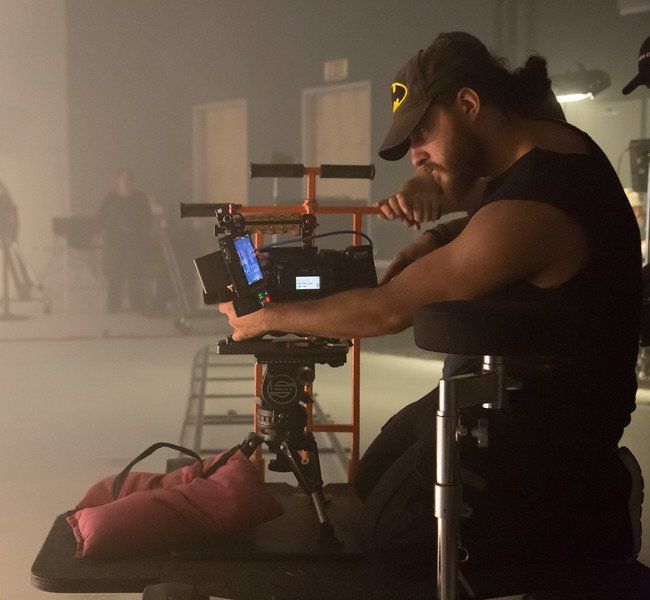Interview: 4 Valuable Tips for Shooting Your First Feature Film
This is an interview with director Christopher Sheffield – I asked him to give 4 tips for filmmakers interested in making their first feature film.
I knew that he’d have some great insights for those filmmakers out there who are looking at shooting their first feature.
His first feature film, “Run for Your Life”, is available on Amazon, and his second feature film, “Split Lip”, is also available on Amazon. Learn more about him and his work at www.christophersheffield.com.
Chris has been directing and producing films for a while now. Since he’s directed two feature films now, he’s got a lot of experience under his belt.
Nick: Do you think there is a ‘right’ time for a director to make their first feature film? What if a filmmaker feels like they aren’t ready?
Chris: In my honest opinion, you’ll never be ready until you get started. It’s a huge undertaking from a personal creative level, a technical level, and a financial level, but if the resources are in place and you have a team alongside you, there’s never a better time than now.
I think it goes without saying that you should walk before you run (create short films and various narrative pieces first to help establish how you want to tell your visual stories) but you won’t know if you’re a capable feature film director until you direct your first feature. It’s a long journey, and a long, long learning process, but you won’t believe how much better a filmmaker you’ll be when you come out the other side of it and deliver a finished and locked edit. It’s one of the best damn feelings of accomplishment.
My advice would be not to think of being a feature film director as some sort of special tier to aspire to – it’s not a club you have to be worthy of or gain others’ approval to join – it’s a big personal stepping stone for YOU as an artist, and if you ever want to make a masterpiece years down the line, you have to start by getting your first feature under your belt.
Nick: There are always a lot of filmmakers out there that are about to get started on their first feature film. What is the most important thing they can do to set themselves up for success?
Chris: A huge thing that a lot of filmmakers forget (especially now-a-days when the run-and-gun freelancer is a frequently sought after position) is that film is, has always been, and always will be a TEAM sport. You cannot make a great film by yourself. You can make a film, sure, you could even do a feature by yourself, but a great film requires a team of talented people you trust.
The truth is that making a film is a massive endeavor that requires around the clock cohesiveness from the crew and sometimes one bad cog can really hurt your shoot day. As much time as you put into your shotlists, location scouts, and casting, you should put into securing and surrounding yourself with a trustworthy and talented film crew who can passionately fill all the required positions on set.
I can’t count the number of times the crew members I’ve had on set have saved my ass and my movie by being diligent, innovative, and hard working when the moment called for it. Everyone from the greenest PA on up to your executive producers need to be people you know are invested in the successful shoot day the same way you are, because when it comes to indie filmmaking, any job that isn’t getting done on set becomes the director’s job to make up for, and believe me, you’ll have enough on your mind as it is.
Nick: What is the biggest blunder you made on one of your feature films – what would you tell your past self to do differently, if you could?
Chris: I think some of my biggest blunders on the set of my films have come from forgetting to reference the work I did in pre-production. Indie films promise long shoot days, quick thinking, lots of compromise, and lots of creative solutions. It can become rather easy for you to be overwhelmed in a moment, surrounded by cast and crew, to make a rush call on a creative decision.
Sometimes I’d walk into a set and start trying to decide how I wanted to shoot/light the scene, realize we only had maybe thirty minutes to light and less than an hour to shoot, and make a rush decision to keep the day moving and get the scene shot.
What I SHOULD have done was taken a deep breath, pulled out my handy director’s binder, read the scene as it’s written, then consulted my shot lists/notes. All the creative decision-making I need is already written down and prepared right there for me if I just take the time on set to refer to my prepared materials.
You’re a different person when you do pre-pro then when you’re on set, and you need to trust that both versions of your mind are only going to make the best decision together.
Nick: What is one big thing that new directors tend to overlook that’s important to prepare for?
Chris: Communication and prior rehearsal with your actors is huge. Sometimes you don’t have that luxury because the actor is flying in from out of town or was recast and brought in very suddenly, but I really can’t overstate how much faster and smoother your day goes if you’re not trying to find the performance while you’re shooting.
Rehearsal can come in many many forms for your actors. It can be a series of conversations about the character, it can be table reads, it can be a session of individual scene study, but I promise you: if you and your lead actors are on the exact same page about who they’re playing and how they’re playing them, your shoot day will go like butter.
You’ll have this wonderful short-hand with them where you don’t need to discuss and explain and argue character choices or line reads. You’ll both just know exactly where the character’s heads are at any given moment. What that does is free you up completely to experiment with your visuals and really take the time to nail the shot in a technical sense, because you already know the artistry of the performance will be there no matter how many takes/shot sizes you do.
About Christopher Sheffield:
Managing Director of Persephone Productions LLC, Christopher Sheffield is a Los Angeles-based freelance Director, cinematographer, and photographer. His last decade of experience includes independent feature films, documentaries, music videos, and commercial productions.
He has two feature films as writer and director (‘Split Lip’ and ‘Run For Your Life’) that are both available on major streaming platforms, as well as a critically successful ongoing DC Comics Batgirl Fan Series. Christopher continues to work and create alongside his producing partner, collaborator, and wife, Stephanie Sheffield, on a multitude of upcoming feature-length projects.
Find him online at www.christophersheffield.com or his IMDb page.
Find his two feature films:



